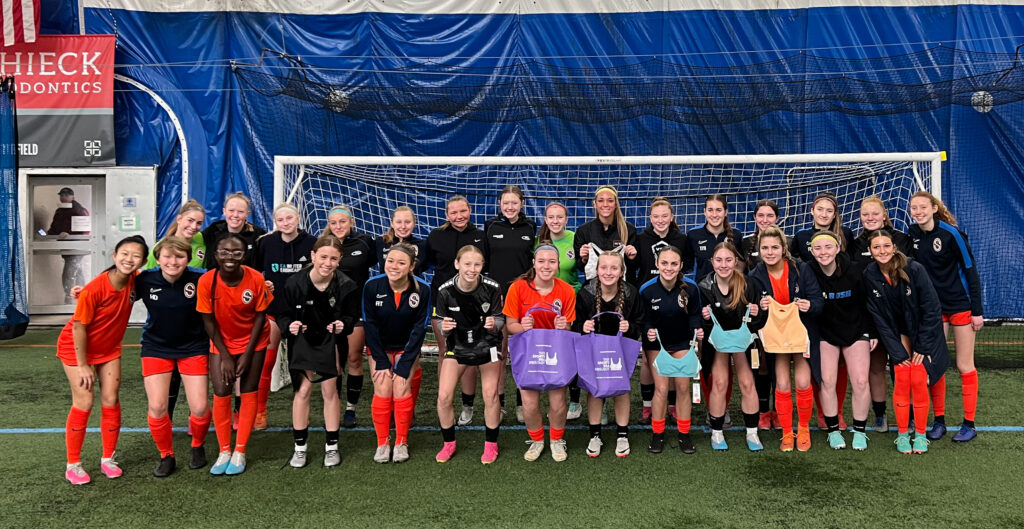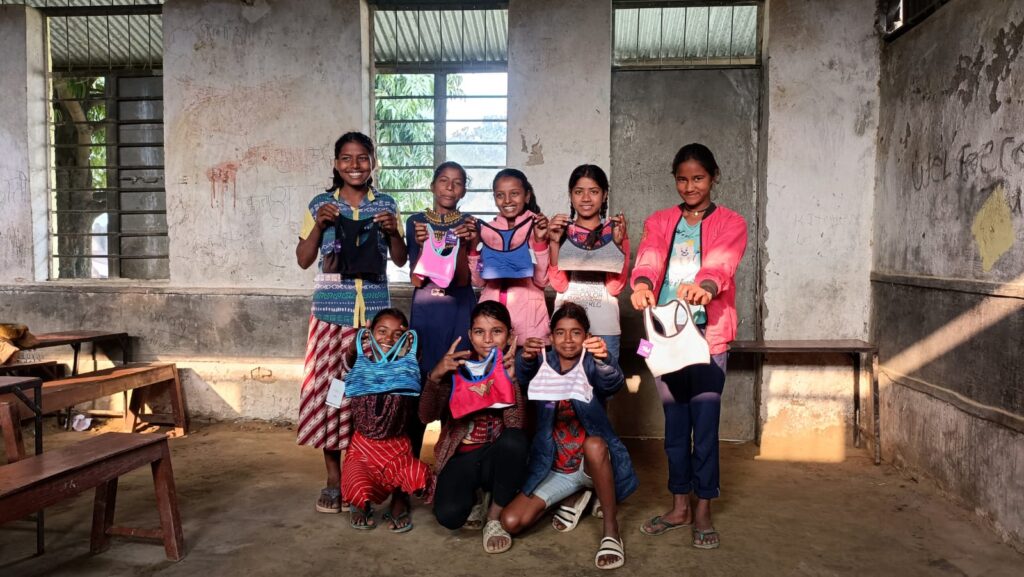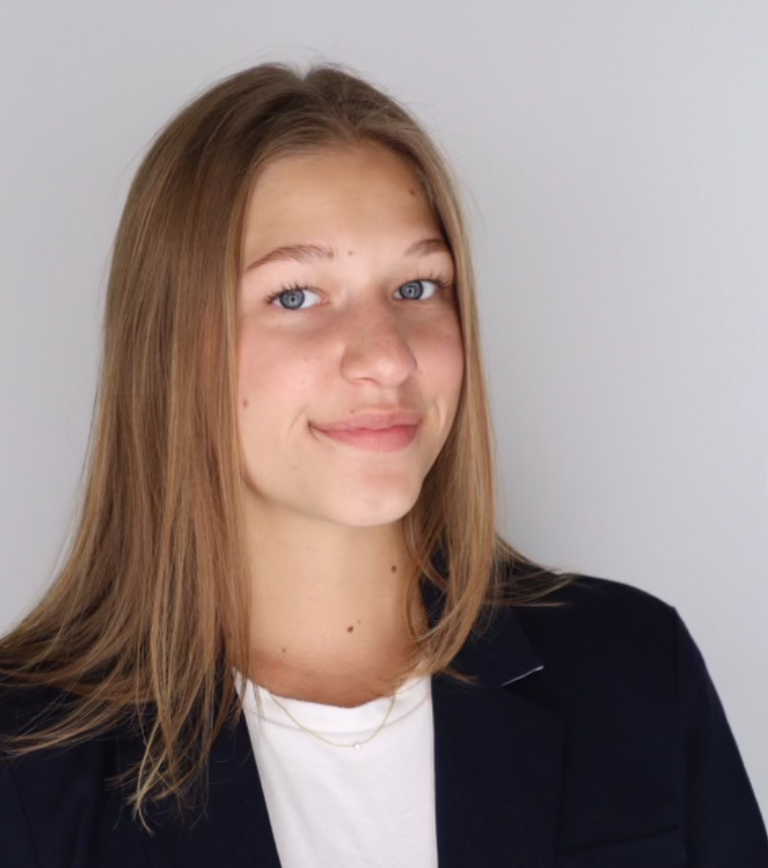“I lead by recognizing and utilizing the strengths of those around me toward a common goal. An important part of that is ensuring that those I work with have the knowledge, tools and the opportunities that they need to contribute and make decisions themselves.”
Popular fitness brands like Lululemon, Alo, and Athleta sell sports bras ranging from $45 to $68. While prices can vary from $15 to $68, many overlook the fact that buying a sports bra at all can be a privilege–not all girls and women have the financial means to make this essential purchase. Without access to proper sportswear, many young women are discouraged from continuing to play sports.
Sarah Dwyer-Schick grew up playing sports and later transitioned into coaching and administrative positions. Having worked within sports as a player and a coach in different capacities with diverse groups of people, it led her to travel to new communities, cultures, and challenges that exposed her to new different realities. Throughout her athletic career, she often found herself as one of the only women in the room. “The Sports Bra Project was born out of frustration,” Sarah states. “I saw a need that was being overlooked and dismissed because current sports leadership is male and the default culture is male, that sports bras are not part of standard equipment is simply one symptom of this.”
Before a 2015 trip to Namibia, Sarah decided to include sports bras in her donations. “The female athlete [at] twelve years old is not going to tell her usually male coach that I can’t play because I don’t have a sports bra. She is going to say I don’t like sports.” Although organizations managed by men for women’s sports couldn’t easily be changed, Sarah believed they could work within and outside these systems and provide direct support to athletes.
On her trip to Namibia, Sarah intended to donate the sports bras to girls in need in rural communities, only to discover that even the women’s national team lacked proper gear. Since then, she has donated to five different national teams, one team having recently performed in the Women’s World Cup in 2024.
Sarah admits, “It is both cool and frustrating to support such elite teams and athletes. That countries find it acceptable to send their women’s teams to international competitions without this basic piece of equipment is indicative of how far we are from equitable sports opportunities.”
Through Sarah’s actions, she has fostered a collaborative network of women, and some men, supporting women in a variety of sports globally.
“There are populations that don’t play soccer, and a lot of them are first generation immigrant girls.” Sarah worked at a club soccer team in Manhattan and acknowledged how that is a fairly diverse city. The boys club team spoke half a dozen different languages compared to the girls which only spoke English—despite their drawing from the same communities. Sarah identified that although the soccer team is recruiting in the same neighborhood and offering the same price structures, there was a vast difference between the two programs. “We still have cultural barriers. Some experience more than others, depending on where they are in their communities.” Sarah recognized that there were some things out of her control, but she still wanted to contribute, so she found something tangible and small that could support organizations.

In 2018, Sarah Dwyer-Schick established The Sports Bra Project to facilitate the donation of new sports bras. By addressing this overlooked or forgotten barrier women have the basic equipment necessary to participate in sports, Sarah has increased the access for young women in sports. The project has donated over 20,000 sports bras across approximately 30 countries with donations from 230 companies and individuals. The Sports Bra Project’s mission is to not only address a physical barrier but normalize the needs and experiences of women in sports and provide a leadership opportunity for others.
Sarah’s foundation goes beyond her and her team–it inspires other girls who want to help. Her leadership is contagious. Sarah’s purpose was to spread awareness about the barriers young women face in sports and empower them to take action. She connected with a 13-year old girl from Manhattan, who chose to collect and donate 200 sports bras as her bat mitzvah project. When Sarah was collecting the bras to later donate them, she asked the young girl why she chose this project, the girl replied, ‘I like sports and I like shopping, so I made an Amazon wish list.’ Her ability to effect change was that easy. Through her efforts, she has provided women globally with sports bras and shown young girls that they have the power to create a change.
The Sports Bra Project announced its partnership with Women Sport Australia in 2020. Their partnership represents the connections made globally with organizations and people committed to spreading opportunity to girls and women through the donation of sports bras. Because sports are universal, those involved in the mission are committed to making sports accessible for all.
“The fun is we get to work with so many different organizations tackling different cultural issues that relate to women in their communities and using sport to do it.”

Her leadership empowers the next generation through equipping them with the tools and opportunities to lead. As a coach, she encourages older athletes to mentor younger players during practice through facilitating drills during practice and assisting the younger girls. Sarah encourages girls to understand their value through reminding them that they are fully capable of doing what they desire. While it may not be easy for the older athletes to orchestrate a drill and have the patience for the younger athletes, Sarah reassures them she will support them. “For me, empowering the next generation or somebody else is giving them the tools and the opportunity that they need to take on those rules themselves and to do those things themselves.” Sarah firmly believes having more leaders as models is essential for the younger athletes to reinforce the idea that leadership is not only about ability, but also confidence.
Sarah leads with a balance of directness and collaboration–a rare combination that allows her to be a decisive leader and thoughtful teammate. She is unapologetically cut and dry, and her direct approach fosters confidence and autonomy in young girls. At the same time, she recognizes that leadership is not about directing others. Sarah does not seek to “give” others power, but to create an environment where girls and women feel empowered to take initiative, and realize they already had that power.
Sarah’s experiences have shown her leadership is not all glamorous. She is the face of an initiative, and she has and will take on criticism that comes along with that role. However, by prioritizing the purpose of the project, and her focus on the girls and women, she sees that her fulfillment comes not from standing in the front, but from watching others take the lead.
As such, The Sports Bra Project fosters a culture of collaboration. For many years, men’s bodies have been the focus of sports. Growing up in the United States and being involved in sports after Title IX has allowed Sarah to have a somewhat better experience, yet also the ability to see that outside of the U.S. other women are struggling. In her experience, she saw when men are the dominant majority in the sports world, most don’t think beyond themselves to address these problems. She also saw that her experience as a woman and an athlete put her in a unique position to fix the issue, and she capitalized on that—creating a force for change with global impact.
“We’re a tool. I really see the Sports Bra Project now as a tool for furthering conversation. Normalizing the needs and experiences of women.”
Images courtesy of Sarah Dwyer-Schick.
Captured Fall 2024.

